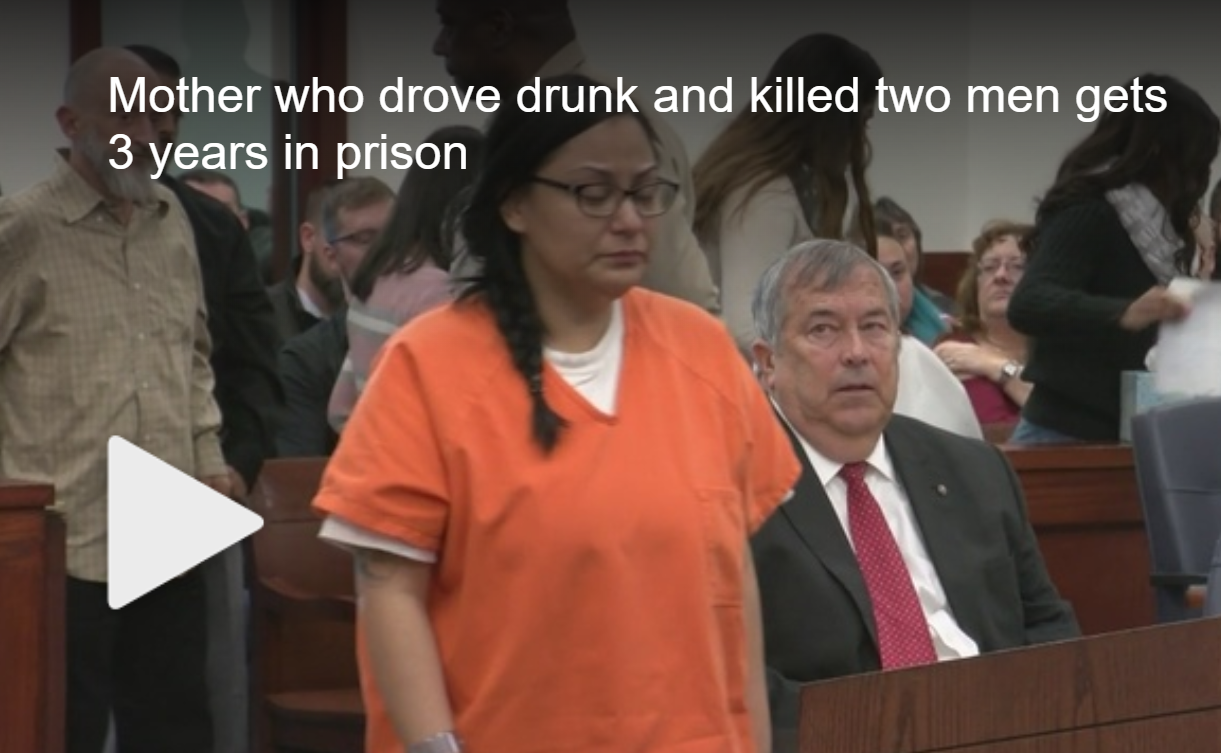RIO RANCHO, N.M. – She drove drunk with her 2-year-old son in the car and plowed into two men changing a tire on the side of I-25, killing them. Christie Noriega was facing more than 30 years in prison, but Thursday a judge gave her a huge break of just three years. Both of the men’s families were shocked by the sentence, many of them bolting from the courtroom in disbelief.
“Nothing will rectify the damage done by her choice to drink and drive. The state has too many families that suffer the consequences of drunk drivers,” Mikey’s mom, Tracy Chambellan, said.
Both Mikey Chambellan and Lonnie Escovedo’s families spoke at Noriega’s sentencing Thursday.
The two men were killed last March when Christine Noriega drove drunk along I-25 and plowed into the two men as they were changing a tire on the side of the road near Bernalillo.
Noriega pled guilty late last year to two counts of vehicular homicide and aggravated DWI, and Thursday she apologized to the men’s families.
“Please know that I am very, very, very sorry for hurting you and breaking your hearts and for taking away Lonnie and Michael,” Noriega said.
The families both asked Judge Louis McDonald to give Noriega the full 30 years before he settled on that three-year sentence.
At one point, the judge said he was concerned about Noriega’s dietary needs in prison. That’s because the mother of five has liver problems.
The victims’ families feel Noriega has never shown remorse and has always acted like the victim in all this.
They even pointed out the GoFundMe page Noriega set up last year to help pay for her legal defense.
Since this is considered a non-violent crime, Noriega will only have to serve half of the three-year sentence.
Arguments of counsel:
Several hours before the accident, Christie Noriega drank too much, but in that she was not alone. Her family did not know, she did not know, that she suffers from a nonalcoholic fatty liver disease which prevented her body from absorbing and eliminating alcohol. They thought it safe for her to drive back to Rio Rancho in the early evening, but she never made it home.
Ms. Noriega pled straight up to the charges, and she accepts responsibility for her actions. As her advocate I often wonder if this accident might have happened even without her drinking. An aggressive driver, someone who triggered more than one 911 call all the way into Albuquerque, tried to pass her on the right. There was a slower moving car on the right so he got behind Ms. Noriega and flashed his lights. She was frightened with her two year old in his car seat, sped up to pass the slower moving traffic and veered into the right lane so the man would stop tailgating and just pass. She was unfamiliar with her eight passenger SUV. It was not as nimble as her old car and it yawed across the fogline. Recently we learned that at least one of the victims had a blood alcohol content of .301, more than twice Ms. Noriega’s .14, nearly four times the legal limit. They too drove drunk and, if sober, they might have driven just a few yards farther after the short span of guardrail and parked safely. The final mistake was the door, wide open. Ms. Noriega clipped it, sending her vehicle into a 180* spin and killing both men.
Dr. Penland is better able than I to discuss Ms. Noriega’s personal characteristics. But let me add that I cannot remember a DOC psych eval in which zeros are marked down the page, a “very low risk” for future misconduct. This woman has made a difference in raising her five children. As Dr. Klein said in his independent report, “it is likely best for all involved that any incarceration that might be felt appropriate to be as short in total time as possible.” I join in his recommendation, and ask the court to consider some or all of the incarceration to be house arrest. We are only recently seeing this form of sentence but it makes sense in this case. It reminds the defendant, her family and the community that there are consequences. It enables the defendant to get the medical intervention her liver requires. It saves taxpayer money and resources better spent for violent defendants and those unable to curb their addictions. And last but not least, it allows her three year old son to get a hug whenever he needs one.
